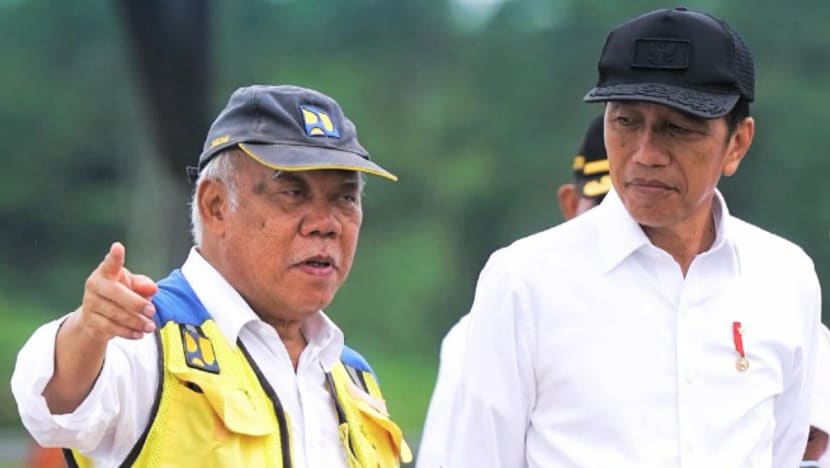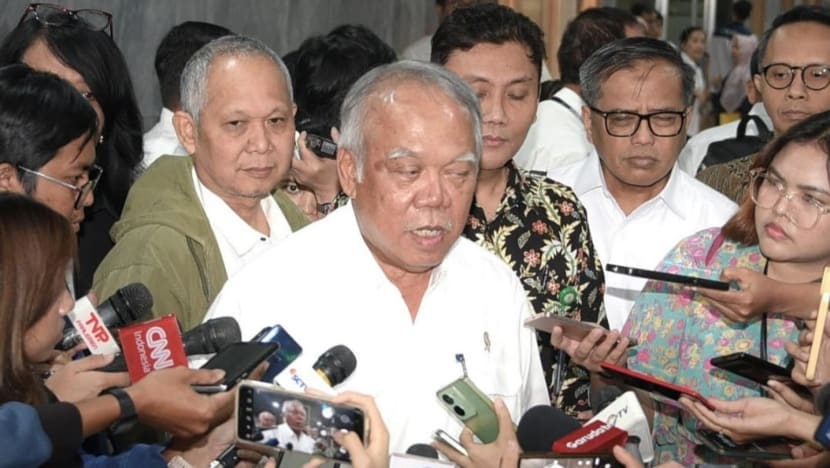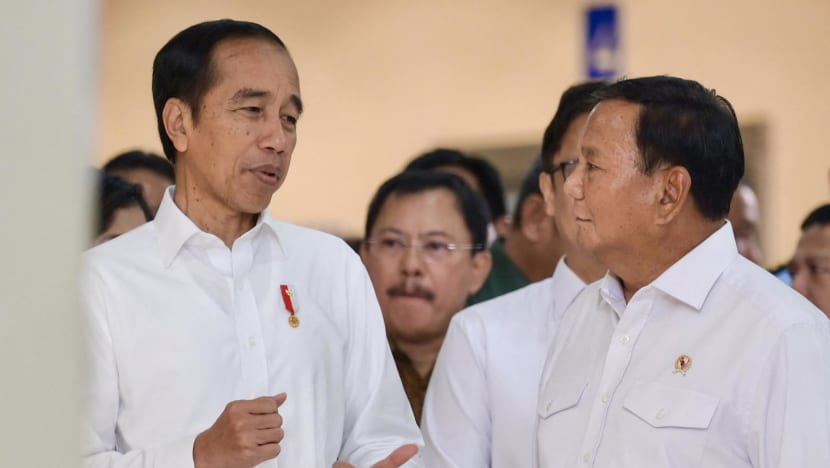Analysis: An Indonesian minister has slammed ‘rush’ over a proposed housing fund. Is discontent brewing against Jokowi?
The public disagreements come amid Mr Joko Widodo’s alleged issuance of controversial policies before the end of his presidential term in October.

Indonesia's Minister of Public Works and Public Housing Basuki Hadimuljono and President Joko Widodo inaugurate the Sepaku Semoi dam that will be the source of water for Indonesia's new capital city, Nusantara, in Penajam Paser Utara, East Kalimantan on Jun 4, 2024. (Photo: Instagram/Kemenpupr)

This audio is generated by an AI tool.
JAKARTA: Indonesia’s Minister of Public Works and Public Housing Basuki Hadimuljono has said he is prepared to delay the implementation of a public housing savings fund, which had recently sparked a public outcry for mandating more groups of workers to contribute part of their salaries.
On Thursday (Jun 6), Mr Basuki told local media that he was prepared to delay the implementation of the fund - also known as Tapera - should members of the House of Representatives (DPR) make a request for it.
The DPR is one of two elected chambers of the People’s Consultative Assembly, which is the national legislature of Indonesia.
“In my personal opinion, if it's not ready yet, why should we rush it?"
"With this (public) outrage, I think I really regret it," Mr Basuki was quoted as saying by Detik.
Analysts whom CNA spoke to said that the public criticisms by Mr Basuki - who is also chairman of the BP Tapera committee - signal a growing discontent between ministers in President Joko Widodo’s Cabinet and the leader himself.
They added that such public disagreements come amid Mr Widodo’s alleged issuance of controversial policies before the end of his presidential term in October, including one involving President-elect Prabowo Subianto.
Mr Prabowo is the current defence minister and is set to be sworn in as the new leader of Southeast Asia’s largest economy on Oct 20.
"More and more of (Mr Widodo’s) circle are realising that (his) policies, lately, appear to be his personal ambitions and projects rather than the goal of prioritising the interests of the people,” said Mr Ray Rangkuti, a political observer from think tank Lingkar Madani Indonesia.
POLICY “NOT READY YET”
The controversy over Tapera began late last month after the Indonesian government made a sudden move to expand the scheme to include private-sector and self-employed workers - including foreigners - to contribute part of their salaries to the fund. Employees will contribute 2.5 per cent of their salaries while their employers foot the remaining 0.5 per cent.
They join civil servants, who have been contributing to the fund since 2016.
On Thursday (Jun 6), thousands of workers staged a demonstration in Jakarta against Tapera. They demanded that Mr Widodo immediately cancel the new policy. Workers rejected the move as they say it reduces their take-home salaries while business owners lament about potential increase to company expenses.
"If there is a proposal from the DPR, for example to postpone it, I have contacted the Minister of Finance (Sri Mulyani Indrawati), we will comply (with the proposal),” Mr Basuki was quoted as saying by Detik.
House of Representatives Commission V Chairman Lasarus has said that the government should postpone the expanded Tapera policy due to objections from the public.
However, Mr Lasarus said the House will hold another special meeting to discuss the issue by inviting various parties, including employers, labour representatives, BP Tapera management as well as the government.
Mr Basuki himself has said he will follow whatever the DPR proposes, including if he has to postpone Tapera’s implementation. He further admitted that policies related to the fund were “rushed” and were not ready, thus triggering public anger.

Earlier last week, Presidential Chief of Staff Moeldoko, stressed that Mr Widodo would not delay Tapera’s implementation. The president had previously said that it was normal for government programs to experience hiccups, and the public would only reap the benefits after it is up and running.
Meanwhile, former coordinating minister for politics, law and security Mahfud MD also criticised the expanded policy, saying that “it makes no sense”.
"The government needs to really consider the public's voice on Tapera. If there is no policy to guarantee that savers will actually get a house from the government, then the mathematical calculation does not make sense," Mr Mahfud, who is also a former vice-presidential candidate in the February elections, wrote on X.
DISCONTENT BREWING AND SHOWING A PUBLIC FACE
Observers told CNA that Mr Basuki and Ms Sri Mulyani’s stance over the Tapera issue is another example of discontent between public officials and Mr Widodo.
While Ms Sri Mulyani has not commented publicly on the issue, Indonesian media has taken Mr Basuki’s statement as a reflection of the finance minister’s stance over Tapera.
"I see that the statements made by Basuki and Sri Mulyani about postponing Tapera do reflect the disagreement between (Mr Widodo) and the ministers in his Cabinet," said Dr Ambang Priyonggo, who is Assistant Professor of Political Communication at the Department of Digital Journalism of the Multimedia Nusantara University.
Just last month, Mr Prabowo disagreed with Mr Widodo over a planned increase in university tuition fees.
Mr Prabowo in his statement quoted by Detik rejected the tuition fee hike, and further called for university education in Indonesia to be free. And although the planned tuition fee hike was eventually canned by the Ministry of Education, Mr Widodo said that fees may still increase next year after a study was made on the issue.

Earlier this week, the head of the Nusantara Authority - Indonesia's new capital city - Bambang Susantono and his deputy Dhony Rahajoe both resigned from their positions.
"The resignation of these two officials (heads of Nusantara) is quite interesting. This is because it is rare to hear officials in the Jokowi era declare their resignation from office. Moreover, they are considered successful in carrying out their duties," said Mr Ray, the political observer.
Meanwhile, Dr Ambang believes that the resignation of the two Nusantara officials is due to their disagreements with Mr Widodo.
"The fact is that there is no evidence, for example, of claims of an influx of foreign investors into Nusantara. The burden of funding this project is indeed very heavy. Meanwhile, Mr Widodo still feels the need to realise (the construction of Nusantara) as his political legacy," he said.
Mr Agung Baskoro, a political analyst at the Trias Politika Strategic research institute, said that there has been a lack of synchronisation lately between the policies of the president and his ministers, and vice-versa.
"This happens because policies are decided in a hurry, without any in-depth study, do not consider the national situation, and do not pay attention to the public interest," Mr Agung told CNA.
LEGACY AFFECTED BY SLEW OF CONTROVERSIAL ISSUES
The analysts also believe that Mr Widodo’s legacy of late has been marked by several controversies, including the election of his son - Mr Gibran Rakabuming Raka - as the incoming vice-president after changes were made to the country’s constitutional laws.
Meanwhile, Mr Widodo’s relationship with the party that supported his political ascent - the Indonesian Democratic Party of Struggle (PDI-P) - was also severed after he endorsed Mr Prabowo in the recent election instead of the party's presidential candidate, Mr Ganjar Pranowo.
According to Mr Ray from Lingkar Madani, Mr Widodo - who is currently without a political party backing him - has no loyal supporters.
"As Mr Widodo’s term comes to an end, political forces are forming new ranks. And in this new lineup, his presence is no longer at the centre. It has been much reduced, considering that Mr Widodo does not have the political power behind him that allows him to negotiate," said Mr Ray.
Meanwhile, Mr Agung from Trias Politika said that the outgoing president should not leave behind policies that may make it difficult for the Prabowo administration later.
"Mr Widodo should be concerned with whether his policies can be continued by Prabowo or not, and ensure that his populist policies are relevant to the needs of the people," said Mr Agung.

















